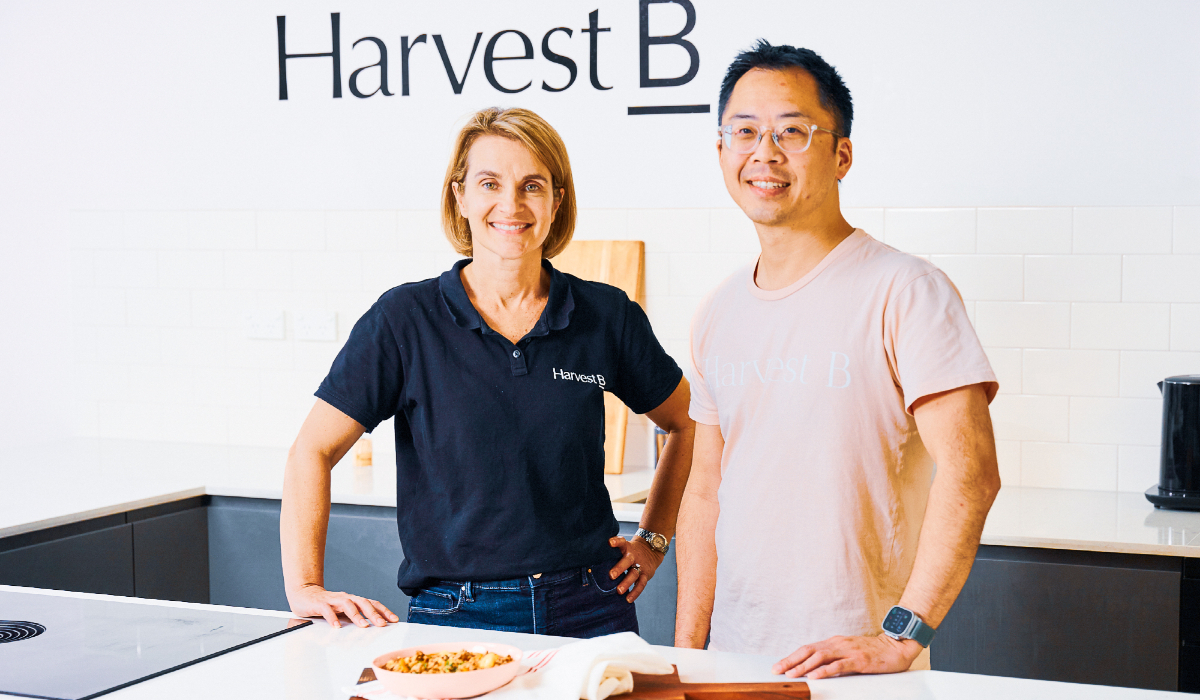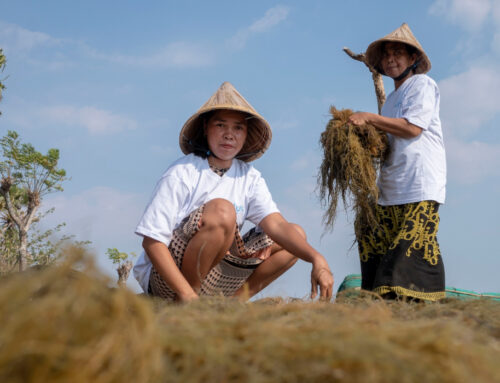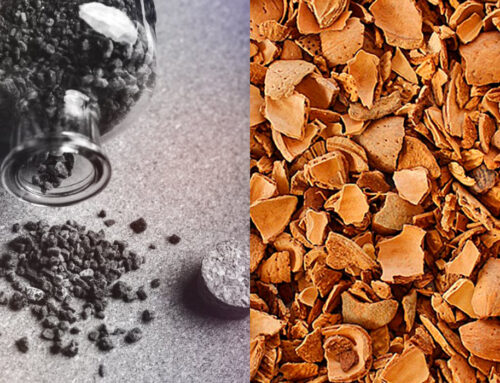We uncover the surprising taste and sustainability of Harvest B’s plant-based proteins, revolutionising diets and reducing emissions with delicious alternatives.
It is a rare and unexpected treat to be given a taste test during an interview, but that’s what I found myself doing when I met food tech company Harvest B’s co-founder and CEO Kristi Riordan. Sitting in the company’s Surry Hills test kitchen, I was served a pumpkin and chicken salad, beef massaman curry and a beef and rice salad. Or so I thought.
Each was delicious, to a fault. What I wasn’t prepared for was the revelation I was in fact eating plant-based protein, not meat or – in the case of the curry – a mixture of the two.
Co-founded in 2020 by Kristi and CCO Alfred Lo, Harvest B is revolutionising the way we eat, and making giant leaps forward in environmental sustainability, our general health and our wallets at the same time.
Kristi and Alfred bring a wealth of commercial, business and venture-backed industry acumen between them: Alfred in deep tech through Cicada Innovations where he was CIO while being an early investor in Sydney-based cultured meat company Vow, and a founder of Startmate, where he was introduced to Kristi.
An accountant and lawyer, Iowa-born Kristi spent 15 years in New York running venture-backed tech businesses before relocating to Australia on a Global Talent visa in 2019. Keen to work together on their next business, both Alfred and Kristi kept returning to the idea of an enterprise that addressed sustainability. Both were reading the international best-selling book Drawdown that explored the 100 most impactful things society can do to reduce our global emissions, number one being reducing food waste and number two being a plant-rich diet, addressing the environmental toll taken by cattle farming in particular.
At the time, the plant-based ‘meat’ industry was booming, globally and locally, but it was clear there were a number of areas that needed improving, including taste, texture and cost. Harvest B launched in 2021, and has since secured $4.5 million in combined grants and venture capital funding, including from Alberts Impact Ventures. Today Harvest B has evolved and refined its model and output and is a focussed food technology business that develops and manufactures ‘delicious, sustainable protein solutions that nourish people and the planet.’
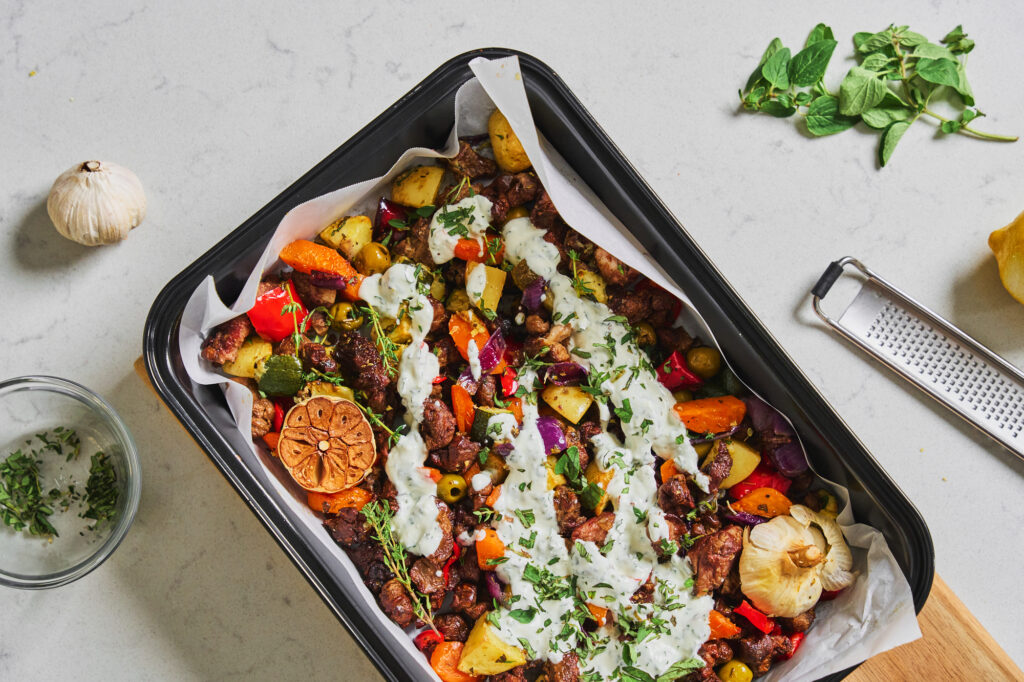
One of Harvest B’s complimentary proteins: slow-cooked Greek lamb
Harvest B acknowledges that, while a plant-rich diet may be the second most impactful thing we can do to drive down emissions, it isn’t the environment that is dictating society’s shopping and consumption habits, it’s taste, price and diet.
“Harvest B’s mission is about sustainability and creating more sustainable proteins; but the problem we’re solving for the market is based on the cost of protein and the health [effects] of protein,” says Kristi. “The mainstream consumer isn’t likely to change based on a desire to be more sustainable in their lives. We have to give them solutions that save money in the shopping basket and, for many, improve their health.”
People are increasingly wary of eating too much red meat given we now know it’s high in fats, cholesterol and has recently been shown to contribute to Type 2 diabetes. And while a 2022 study from Griffith University showed 32 per cent of Australians reduced their meat consumption in the past year, many of us love cooking and eating meat.
Using world-first patent-pending technology, Harvest B offers a half meat-half-plant-based slow-cooked lamb and meat product (the massaman I tasted) that contains half the cholesterol, 45 per cent less saturated fat, and costs approximately 20 per cent less than its meat equivalent. They also offer a wide range of soy and wheat-based proteins that mimic chicken breast, chicken thigh, beef mince and shredded chicken, among many other products.
“You can use them for vegan or meat meals, in soups, sauces, noodle and rice dishes,” says Kristi. Both Harvest B and its customer-facing offshoot B Strong offer comprehensive recipes and meal ideas including chicken and veggie soup, lamb protein bowl and a chicken sesame noodle bowl.
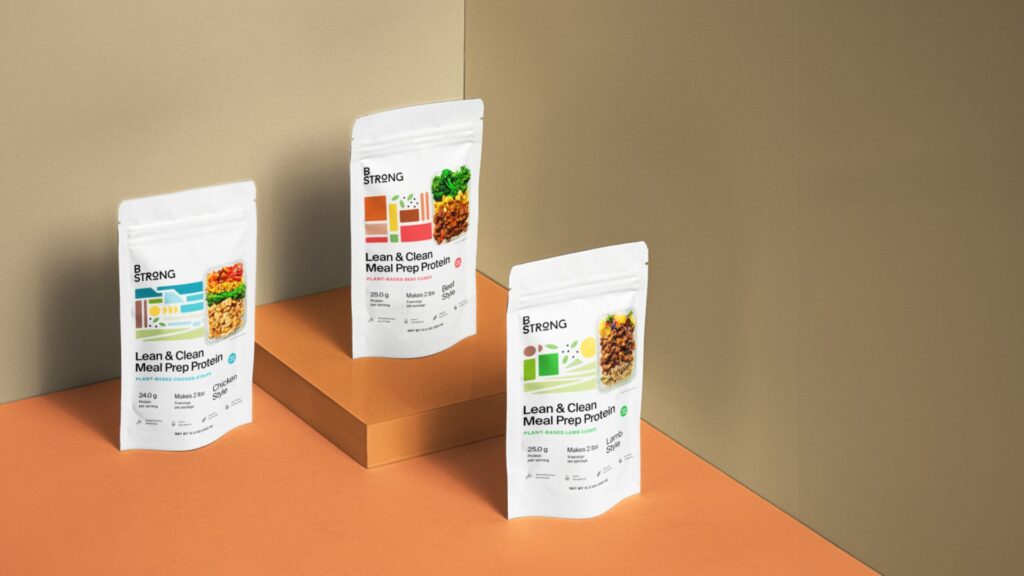
Harvest B’s B Strong Lean & Clean Meal Prep Protein
Kristi notes there’s a growing segment of people buying ready-made meals who are focussed on high protein and strength, particularly among 25- to 40-year-olds. Harvest B is now partnering with a number of professional athletes to help boost their protein levels; and collaborating with performance dietician Jessica Spendlove who works with various professional sporting teams and is now expanding to high-performing executives to help them optimise their diets.
It isn’t just consumers who are interested in a healthier, more sustainable diet. Kristi notes large multinationals are taking seriously 2030 emission reduction targets and, mindful of their supply chain, are making responsible decisions, particularly those running large food service companies.
Harvest B has recently partnered with Compass Group, one of the world’s largest food service providers, serving an array of Australian institutions including defence, aged care, hospitals and education. Many of them need to meet mandated levels of protein in the food they provide, while keeping costs down. Harvest B’s Proteins range are not only a good source of protein but provide dietary fibre, are low in saturated fats, and contain the full essential amino acid profile.
It’s a win: win solution. “If you look at reducing from 100 per cent animal protein to one that’s 50:50 we see 46 per cent emissions reduction and if you go [completely] plant-based that’s a 90-92 per cent reduction, especially in beef products,” says Kristi.
“I think we’re headed into an era of wellness and learning how to incorporate that into daily life,” says Kristi. “Food is a sensorial experience, a cultural experience, a joyful experience and as food developers, we have to keep all these things in mind to win over customers. We believe there is an opportunity to help people eat the right things in each mouthful with more plant protein, even for people who love animal protein. This is a new frontier.”
